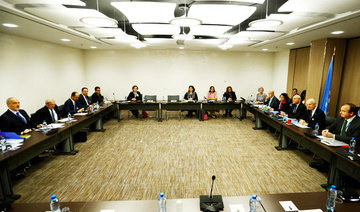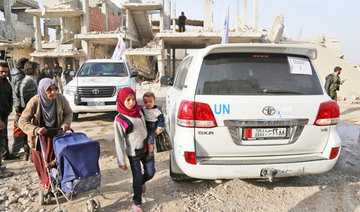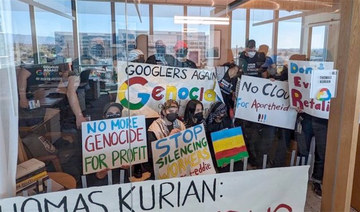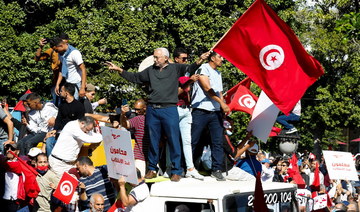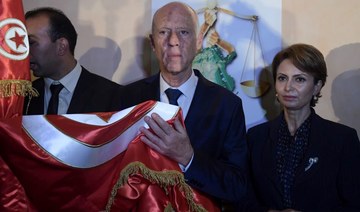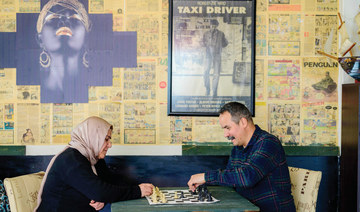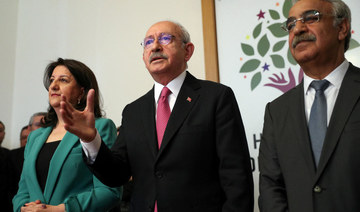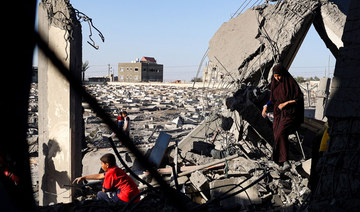BEIRUT: At the doors of the Syrian capital, children with wrinkled faces and arms like sticks are going hungry because President Bashar Assad’s forces, supported by Russia and Iran, are blocking trucks filled with humanitarian relief.
As the government and its opponents wrap up another fruitless round of talks in Geneva, humanitarian officials warn that conditions outside Damascus have reached crisis levels, with the government maintaining a siege on the Eastern Ghouta suburbs that has trapped close to 400,000 people without enough food, fuel or medicine for the winter.
They say patients with empty stomachs and kidney failure are dying in their beds while waiting for evacuation to hospitals just minutes away.
The fighting in Syria’s nearly seven-year war has tapered off in many areas since local cease-fires took hold, but the suffering in Eastern Ghouta — Damascus’ once fertile hinterland, now cut off from the world — has only gotten worse.
According to the UN, roughly one in eight children are malnourished in Eastern Ghouta — a shocking jump from one in 50 in May.
A top UN humanitarian official for Syria, Jan Egeland, said last week the government is refusing to allow convoys in. It has also refused to approve a list of nearly 500 people urgently needing medical evacuation.
“We have people here who are only eating a meal every two or three days,” Ismael Yasin, a member of Eastern Ghouta’s local council told The Associated Press via Skype. “People’s faces are turning yellow from hunger.”
The siege cast a cloud over the eighth round of UN-sponsored talks in Geneva, which concluded Thursday without any results. The head of the opposition’s delegation, Nasr Hariri, said the impasse on Eastern Ghouta reflected the international community’s “shame, impotence, and dereliction.”
“It’s shameful that we have to go into negotiations so that they (the government) give us some loaves of bread,” said Hariri.
The UN envoy to Syria, Staffan de Mistura, called the Eastern Ghouta blockade and others like it a “medieval” approach to war. Amnesty International said last month that the government’s use of sieges against civilians — a tactic it called “surrender or starve” — was a crime against humanity.
But the tactic has proven brutally effective for the government, which in the last two years has managed to recapture a constellation of towns around Damascus using the same playbook. In Zabadani and Daraya, the government executed its strategy so completely that it managed to completely depopulate the two towns, which had a combined population of about 100,000 people before the war.
The government has followed the same strategy to restore its authority over the cities of Aleppo and Homs. The government denies besieging opposition areas, saying the militants, whom it refers to as “terrorists,” withhold aid.
At least three rebel factions still claim a presence in Eastern Ghouta, and send shells whistling into the capital on a daily basis.
In mid-November, a powerful faction called Ahrar Al-Sham captured parts of a military base in the region, prompting the government to respond with waves of airstrikes and shelling that killed over 200 civilians, according to the Britain-based Syrian Observatory for Human Rights. Ahrar Al-Sham said it attacked the base in response to the deteriorating humanitarian situation.
Shortages have gotten so dire that residents are eating out of the trash and parents are skipping meals so their children can eat, Jakob Kern, the World Food Program’s top official in Syria, told The Associated Press.
“They look exhausted, they look tired, and there is this despair in their eyes,” said Kern, who entered Eastern Ghouta with one of the few aid convoys the government has allowed in recent weeks.
The convoys have provided just a trickle of relief — supplies for tens of thousands of people that will last only a month or less, at a time when hundreds of thousands are in need.
Photos from Eastern Ghouta show children gaunt with hunger, their skin wrinkled and aged. Mothers are not producing milk to feed their infants, and baby formula is too scarce and expensive for most families to afford. Driven by desperation, some residents are trying to eat animal fodder.
Since at least 2015, there have been Syrians dying every winter of starvation and other medical ailments made worse by the bitter cold. Families in besieged areas, as well as camps for the displaced, burn furniture, plastics, and even the doorframes and roof supports of their homes to cook and stay warm, as the cost of fuel has soared far beyond reach for most.
Much of the country, including the hilly terrain around Damascus, sees freezing rain and snow in the winter months.
Egeland said last week that 12 people have died waiting for medical evacuation from Eastern Ghouta. They were on a UN-drawn list first submitted six months ago that has yet to be approved by the government, and now contains 494 names. The UN’s children agency said Sunday that 137 children require immediate evacuation for conditions that include kidney failure, severe malnutrition and conflict wounds.
Egeland, in pointed remarks in Geneva, placed full blame on the government for impeding aid shipments across the country.
Eastern Ghouta saw large protests in the early days of the 2011 Arab Spring uprising against Assad. Government forces surrounded the area in 2013, but for most of the last four years, they turned a blind eye to tunnels and above-ground smuggling. Activists say local commanders made huge sums of money from checkpoint bribes, and traders got rich selling to a captive market. Patches of farmland also provided some food.
The government tightened the noose this year, closing the tunnels and nearly all the crossings. Food in Eastern Ghouta at one point was up to 85 times more expensive than in Damascus, just a few minutes’ drive away, according to the WFP.
“We need for the siege to be lifted,” said Anas Al-Dimashqi, a local media activist. “Not just in front of the cameras, as the government does every now and then.”
Hunger at Damascus’ door as Syrian government blocks aid
Hunger at Damascus’ door as Syrian government blocks aid
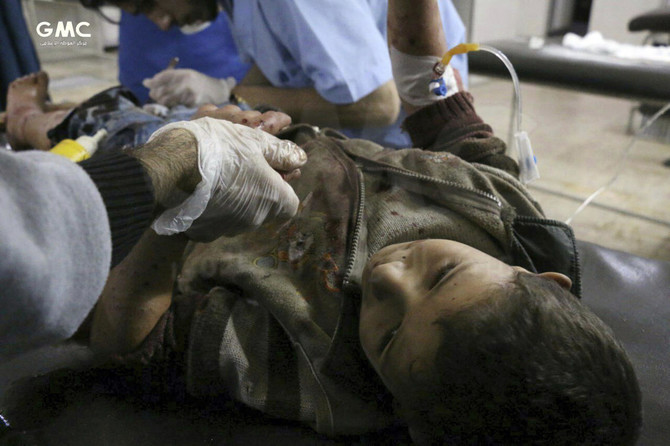
UAE announces $544 million for repairs after record rains
"A ministerial committee was assigned to follow up on this file... and disburse compensation in cooperation with the rest of the federal and local authorities," said Sheikh Mohammed
DUBAI: The United Arab Emirates announced $544 million to repair the homes of Emirati families on Wednesday after last week's record rains caused widespread flooding and brought the oil-rich Gulf state to a standstill.
"We learned great lessons in dealing with severe rains," said Prime Minister Sheikh Mohammed bin Rashid al-Maktoum after a cabinet meeting, adding that ministers approved "two billion dirhams to deal with damage to the homes of citizens".
Wednesday's announcement comes more than a week after the unprecedented deluge lashed the desert country, where it turned streets into rivers and hobbled Dubai airport, the world's busiest for international passengers.
"A ministerial committee was assigned to follow up on this file... and disburse compensation in cooperation with the rest of the federal and local authorities," said Sheikh Mohammed, who is also the ruler of Dubai, which was one of the worst hit of the UAE's seven sheikhdoms.
The rainfall, the UAE's heaviest since records began 75 years ago, killed at least four people, including three Filipino workers and one Emirati. UAE authorities have not released an official toll.
Cabinet ministers also formed a second committee to log infrastructure damage and propose solutions, Sheikh Mohammed said in a post on X, formerly Twitter.
"The situation was unprecedented in its severity but we are a country that learns from every experience," he said.
The storm -- which dumped up to two years' worth of rain on the UAE, a federal monarchy with a 90 percent expatriate population -- had subsided by last Wednesday.
But the glam-hub of Dubai, touted as a picture-perfect city, faced severe disruption for days later, with water-clogged roads and flooded homes.
Dubai airport cancelled 2,155 flights, diverted 115 and did not return to full capacity until Tuesday.
"We must acknowledge... that there has been an unreasonable and unacceptable deficiency and collapse in services and crisis management," prominent Emirati analyst Abdulkhaleq Abdulla said Wednesday on X.
"We hope that this will not be repeated in the future," he added, in a rare public rebuke.
Climatologist Friederike Otto, a specialist in assessing the role of global warming on extreme weather events, told AFP it was "high likely" that the rainfall "was made heavier by human-caused climate change".
The United Arab Emirates announced $544 million to repair the homes of Emirati families on Wednesday after last week's record rains caused widespread flooding and brought the oil-rich Gulf state to a standstill. (Reuters/File)
Israeli army strikes 40 Hezbollah targets in south Lebanon
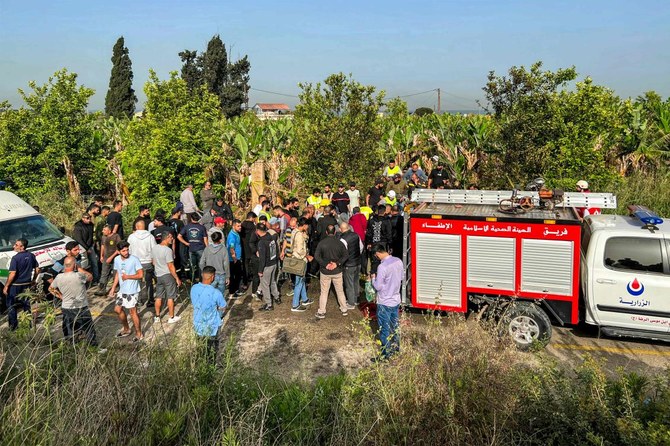
- Hezbollah has exchanged near-daily fire with the Israeli army
- Israel says 11 soldiers and eight civilians have been killed on its side of the border
Beirut: The Israeli army said Wednesday it struck 40 Hezbollah targets in southern Lebanon as near-daily exchanges of fire rage on the border between the two countries.
“A short while ago, IDF (army) fighter jets and artillery struck approximately 40 Hezbollah terror targets” around Aita Al-Shaab in southern Lebanon, including storage facilities and weaponry, the army said in a statement.
Lebanon’s Iran-backed Hezbollah movement said it fired a fresh barrage of rockets across the border earlier in the day after a strike blamed on Israel killed two civilians.
The group had already fired rockets at northern Israel late on Tuesday “in response” to the civilian deaths.
Hezbollah has exchanged near-daily fire with the Israeli army since its ally Hamas carried out an unprecedented attack on Israel on October 7, triggering war in Gaza.
It has stepped up its rocket fire on Israeli military bases in recent days.
Hezbollah fighters fired “dozens of Katyusha rockets” at a border village in northern Israel “as part of the response to the Israeli enemy’s attacks on... civilian homes,” the group said in a statement.
On Tuesday, rescue teams said an Israeli strike on a house in the southern village of Hanin killed a woman in her fifties and a girl from the same family.
Since October 7, at least 380 people have been killed in Lebanon, mostly Hezbollah fighters but also 72 civilians, according to an AFP tally.
Israel says 11 soldiers and eight civilians have been killed on its side of the border.
Tunisia law professors call for release of detained opposition figures
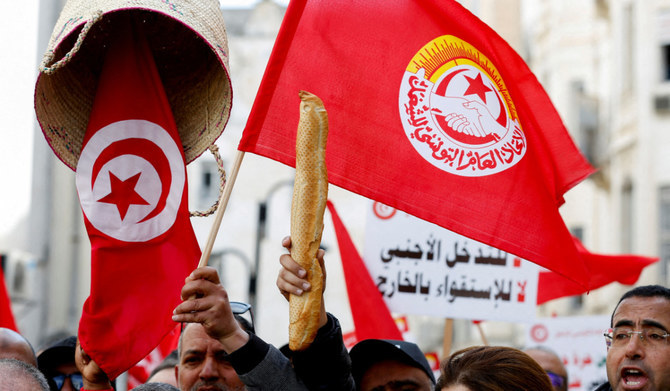
- Since a flurry of arrests in February 2023, around 40 critics of President Kais Saied have been facing charges of “conspiracy against the state“
- Eight of the critics have been detained since, and have yet to see trial
TUNIS: More than 30 Tunisian law professors on Wednesday called for the release of several political opposition figures arrested last year, pointing out that the 14-month legal limit for pre-trial detention had passed.
Since a flurry of arrests in February 2023, around 40 critics of President Kais Saied have been facing charges of “conspiracy against the state.”
Eight of the critics have been detained since, and have yet to see trial.
They were expected to be released earlier this month after their detention was extended twice — four months each time — following an initial six-month stint, their lawyers said.
Yet all eight remain in detention after a court hearing on their case was put off until May 2.
This means they have been detained for more than 14 months without trial, which is the limit under Tunisian law.
“Keeping them in prison beyond the period of preventive detention is a violation (of Tunisian law),” read a statement signed by 33 law professors, including three deans.
The professors said the eight must be released, accusing the Tunisian authorities of putting them in what they called “forced detention.”
The country’s anti-terrorism court is investigating the political opponents for trying to “change the nature of the state” under Tunisia’s penal code.
In a letter addressed to President Saied last month, rights group Amnesty International called for the “immediate and unconditional” release of the detainees.
“I call on you to cease your targeted arrests of critics for the peaceful exercise of their rights to freedom of expression,” the letter read.
Saied, a former law professor, has ruled by decree since orchestrating a sweeping power grab in July 2021 in Tunisia, which saw the onset of what came to be known as the Arab Spring a decade earlier.
The eight detainees include former Islamist-inspired Ennahdha party figure Abdelhamid Jelassi, co-founder of the left-wing National Salvation Front coalition Jawhar Ben Mbarek and political activist Khayam Turki.
After the wave of arrests last year, the United Nations voiced alarm over “the deepening crackdown against perceived political opponents and civil society in Tunisia, including attacks on the independence of the judiciary.”
Critics have denounced Saied’s crackdown on opponents, accusing him of exploiting Tunisia’s judiciary as the country prepares for presidential elections set to take place later this year.
Turkish minister warns pro-Kurdish party it could face moves to ban it
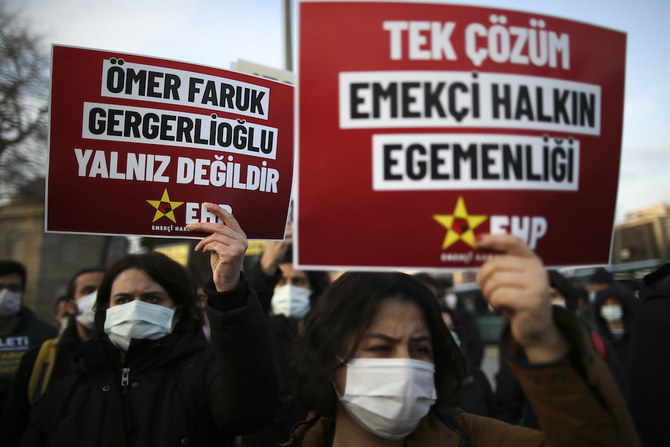
- “In the past, closure cases were opened against parties for supporting terrorism,” Justice Minister Yilmaz Tunc told reporters in Ankara
- “Therefore, we say that if the DEM Party follows the same path, then it will face the same treatment”
ISTANBUL: Turkiye’s justice minister warned the country’s main pro-Kurdish DEM party on Wednesday that it would face the risk of legal action, and even a closure case like its predecessor, if it did not distance itself from Kurdish militants.
DEM, parliament’s third largest party, was established last year as a successor to the Peoples’ Democratic Party (HDP), which is facing the prospect of closure over alleged militant links in a court case following a years-long crackdown.
“In the past, closure cases were opened against parties for supporting terrorism,” Justice Minister Yilmaz Tunc told reporters in Ankara, noting that some parties had been banned and that other cases were ongoing.
“Therefore, we say that if the DEM Party follows the same path, then it will face the same treatment,” he said. “We say keep your distance from terrorism if you do not want to face such a legal process.”
Another court had been expected to announce a verdict this month in a case trying jailed former HDP leaders and officials over 2014 protests triggered by a Daesh attack on the Syrian Kurdish town of Kobani. That verdict was postponed.
“They should not wag their fingers at us. I repeat, the policy of closure, blackmail and threats is over,” DEM Party co-chair Tuncer Bakirhan said on Wednesday in the wake of a call from a government ally to ban the DEM Party.
Critics say Turkish courts are under the influence of the government and President Tayyip Erdogan, which he and his AK Party (AKP) deny.
Both prosecutors and the government accuse the HDP of ties to the militant Kurdistan Workers Party (PKK), which is deemed a terrorist group by Turkiye, the United States and European Union. The HDP denies having any connections with terrorism.
The PKK launched an insurgency against the Turkish state in 1984 and more than 40,000 people have been killed in the conflict. A peace process between Ankara and the PKK fell apart in 2015 and in a subsequent crackdown on the HDP thousands of its officials and members have been arrested and jailed.
UAE, Bahrain call for joint work to contain tensions threatening regional stability
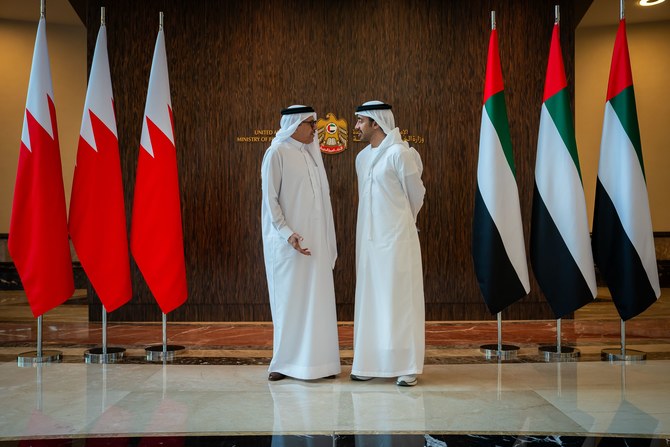
- During a meeting in Abu Dhabi, the ministers discussed the fraternal relations between UAE and Bahrain
DUBAI: UAE Minister of Foreign Affairs Sheikh Abdullah bin Zayed Al Nahyan received his Bahraini counterpart Dr. Abdul Latif bin Rashid Al Zayani in Abu Dhabi on Wednesday.
Sheikh Abdullah bin Zayed welcomed the Bahraini Foreign Minister, and during the meeting held at the ministry’s headquarters in Abu Dhabi, they discussed the fraternal relations between the two countries, and ways to enhance Emirati-Bahraini cooperation at various levels, WAM reported.
Sheikh Abdullah stressed during the meeting that the UAE and Bahrain are linked by historical relations that are becoming more established, developed and growing, and that they also constitute an important tributary to joint Gulf and Arab work.
He also stressed that the current challenges facing the region require intensifying cooperation, coordination and joint work to contain all tensions that threaten its stability, security and safety of its people.


